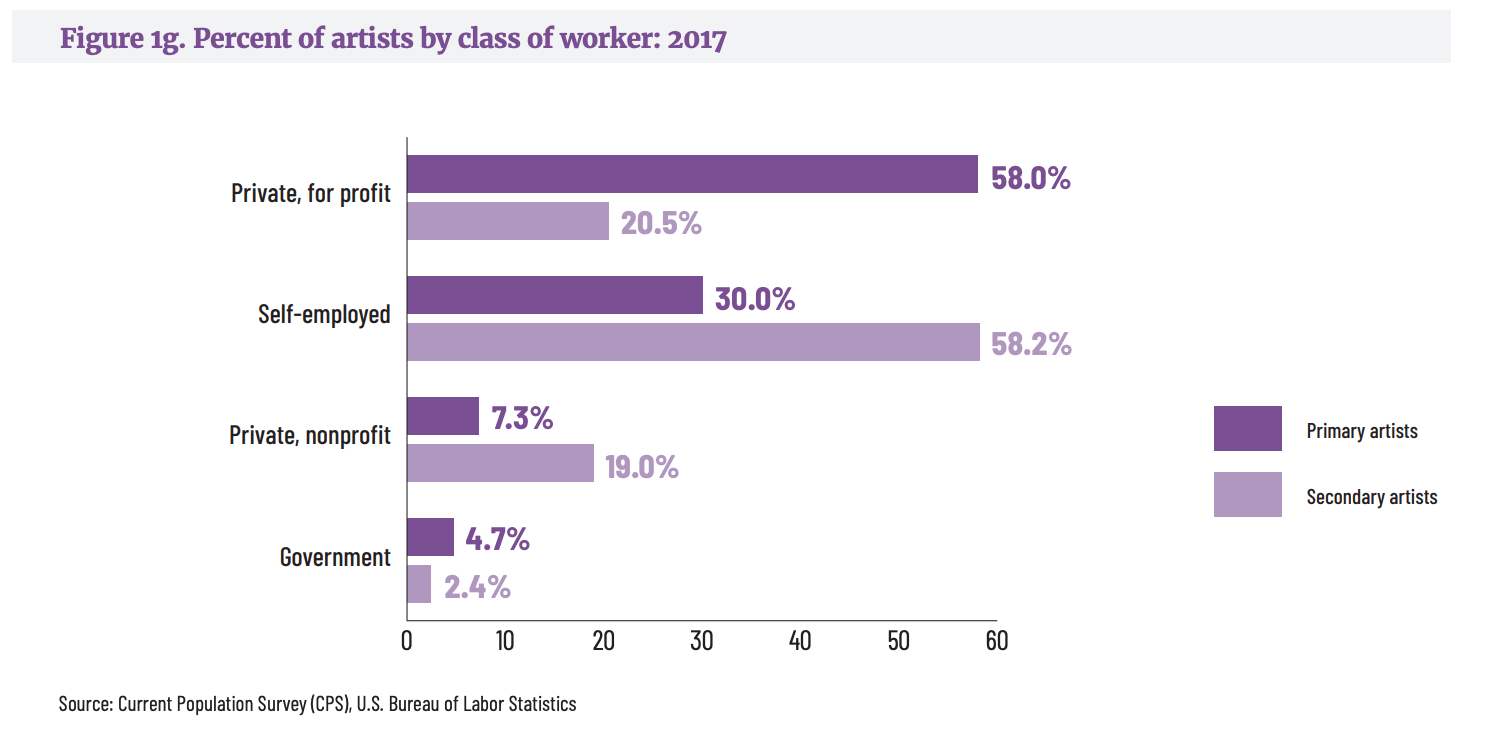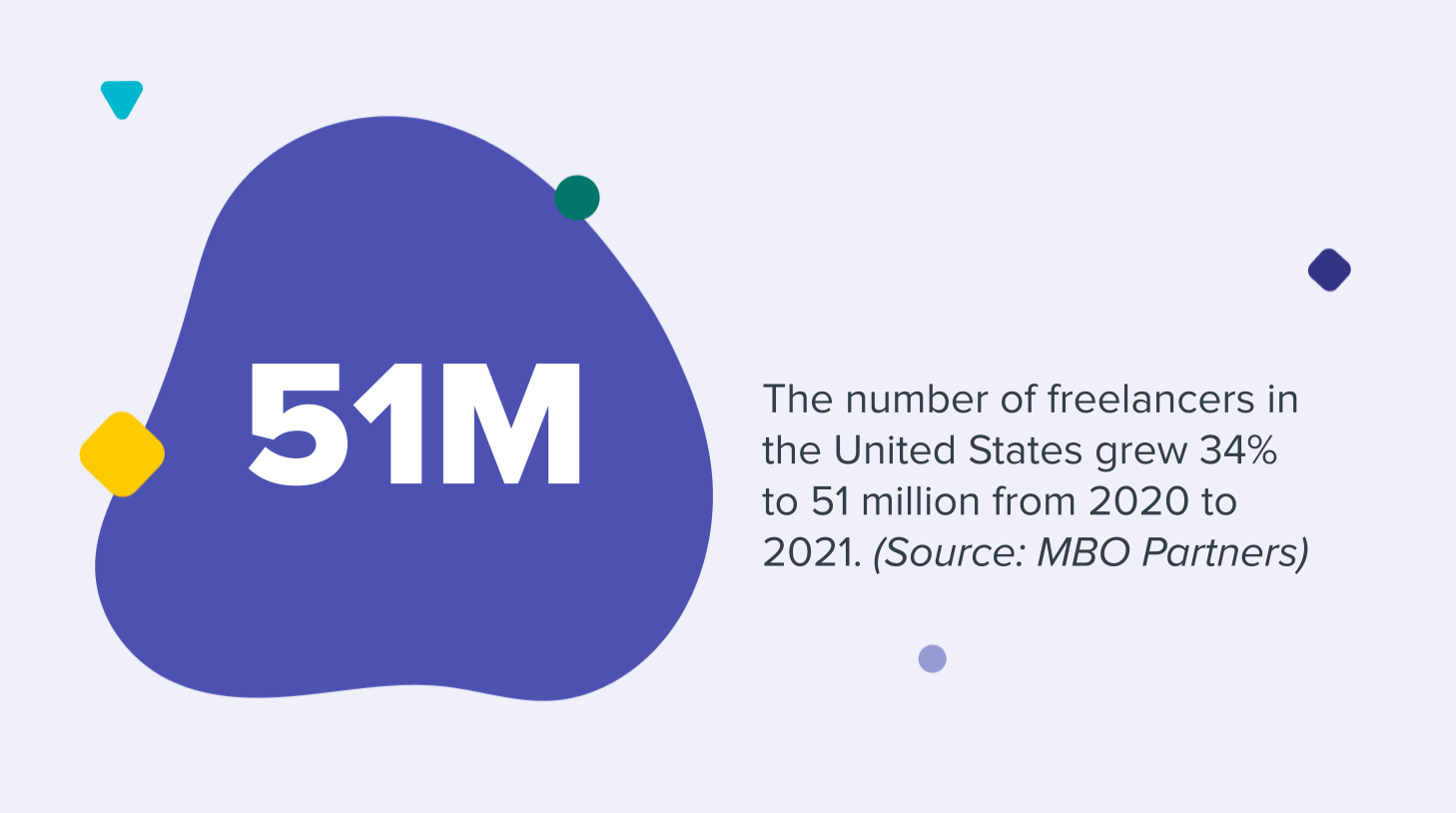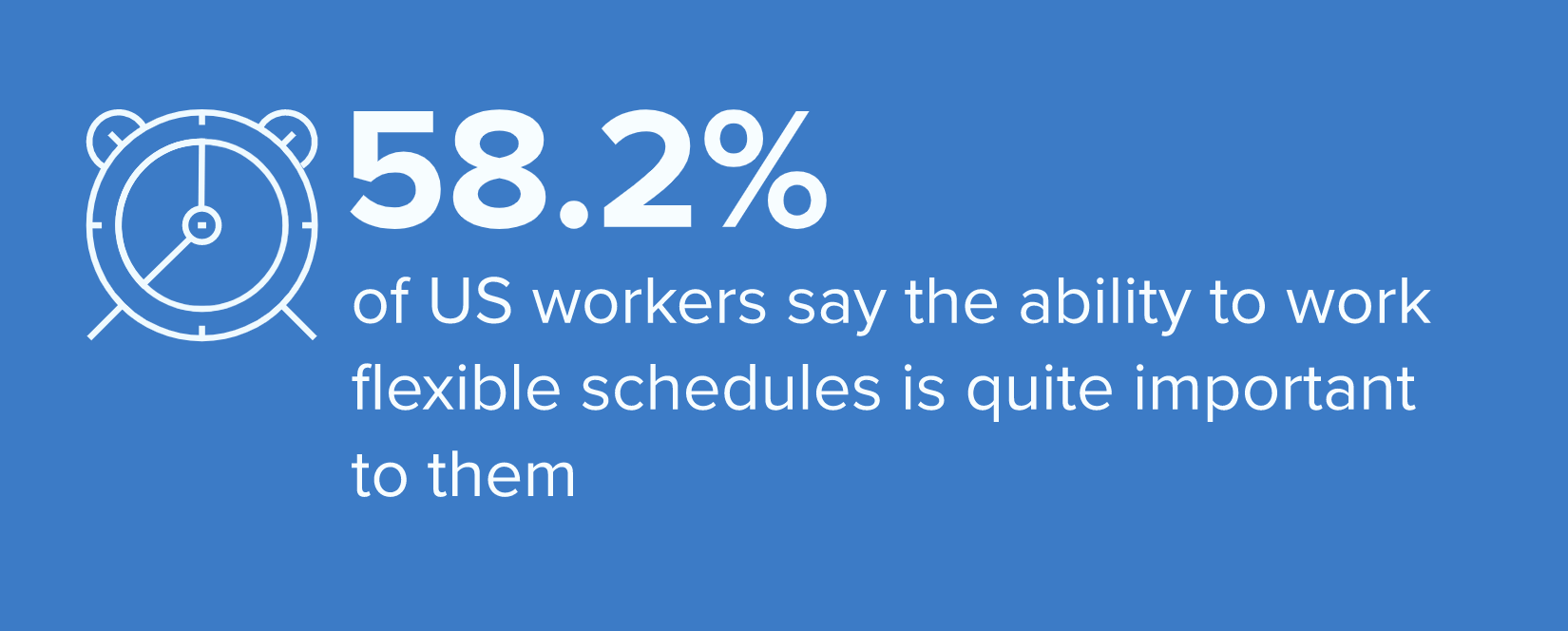Starved for talent? Support the freelance lifestyle at your work
In today’s labor crisis, SMB employers should take a lesson from the rapidly growing number of freelancers. You can attract qualified talent by highlighting what your company has to offer from a freelancer’s perspective.
We’re currently seeing a broad cultural shift in the way we think about work and personal responsibilities. Though they generally don’t have the option to retire, younger workers are increasingly choosing to start their own businesses or work as freelancers.
In fact, some surveys tell us that as many as 54% of all members of Gen Z want to become freelancers or start their own business. The number of self-employed people in 2021 was up 34% from 2020 to a staggering 51 million people in the United States. That’s roughly 15% of the entire population in the country working for themselves.
Cultural factors such as the rise of side hustles and part-time employment opportunities available through the Internet and social media are contributing to these numbers. More than two-thirds (68%) of those who began freelancing in 2021 were either millennials or Gen Z. The Bureau of Labor Statistics reports that self-employment is due to rise quicker than average employment growth over the next 10 years.
Employers need to catch up
During the pandemic and this challenging employment market, employers must reckon with these trends and consider how to incorporate this cultural shift into their recruitment policy.
During the pandemic and this challenging employment market, employers must reckon with these trends and consider how to incorporate this cultural shift into their recruitment policy.
While some effects of these trends can certainly be traced back to timing and the pandemic, the broader move towards virtual work and self-employment is a permanent one.
Those who choose the freelance and self-employed route are doing so for a variety of reasons. Employers need to understand what those are, and think about how to replicate them in their own workplaces if they want to remain competitive in the talent market.
There are, of course, benefits and drawbacks to self-employment and business ownership. Let’s first look at the main benefits:
What are the advantages of being self-employed?
1. Flexible schedule
Our collective understanding of work-life balance is changing to prioritize more time with family and better mental health. One of the themes we saw over and over again in the research we shared in our Great Discontent report was that candidates increasingly value a flexible work schedule.
This trend is reflected in candidates’ preferences – and often, their need – for jobs that allow them to work when it’s most convenient for them.
Flexible work, of course, is one of the hallmarks of self-employment. By definition, the contractor/client relationship prohibits clients from dictating how and when the contractor does their work, as they do for their employees.
2. Remote work
Despite some predicting that remote work would end en masse as soon as the pandemic did, we haven’t seen that occur. Instead remote work, like COVID-19, appears here to stay.
Candidates in our recent survey responded that, like flexible work, remote work options were very important when making the decision on where to work. Many are flat-out turning down jobs that are requiring employees to return to work in-person. And as is also the case with flexible work, countless self-employed people choose to work remotely.
Remote work also reduces or eliminates time spent commuting – we found that to be a perk in the Great Discontent survey as well. It’s also a benefit in other areas, as commuting is bad for our mental health, our finances, and the environment.
3. Better balance of caretaking/parenting challenges
Self-employed people can choose to work when and where they please. This is a bonus when it comes to caring for other family members – especially parents of young children.
They can take time off to take children to doctor’s appointments, or for a leisurely lunch with a friend, without needing to justify their actions.
4. 100% ownership of your business
Freelancing allows individuals the chance to create and retain their business’ value. This compared to a full-time employment scenario, in which a person rents out their labor to build value for a company, but retains no ownership stake or long-term financial investment in the company’s success.
The self-employment model potentially offers more financial stability and opportunities for wealth generation in the long term than traditional full-time employment. In fact, in a recent Upwork-commissioned study from September 2020, 60% of freelancers said they make more than they would in a traditional full-time job – and that percentage is up seven points from 2019.
5. No red tape or corporate politics
Excluding the red tape associated with handling your own business affairs like taxes, self-employment is refreshingly free of the red tape and politics associated with the corporate world.
When you’re outside of the corporate hierarchy, the contortions that full-time corporate employees must go through to manage social expectations, coworker relationships, and bosses are none of your concern.
This can be remarkably freeing, especially for introverts or others who are averse to the petty politics that often govern an office’s social structure.
6. Uncapped earning potential
Very few traditional full-time professions offer the benefit of uncapped earning potential, though this is one of the coolest and most convenient benefits of freelancing.
Freelance work, and therefore one’s income, can be scaled up or down depending on a person’s income targets for a given month. Your nanny is on vacation so you need to focus on taking care of your three children this month? Scale down for less responsibility and more free time. Looking to save for a down payment on a home? Scale up by looking for more, or higher paying, clients.
7. Ability to do work you’re passionate about
For many, self-employment represents the opportunity to do work they’re deeply passionate about. Often we are skilled in areas that we’d enjoy working in but in which there are no real full-time jobs available. Freelancing can give individuals the opportunity to combine their unique skill sets and pursue work they’re uniquely qualified for.
We see this play out in the arts industry specifically, where rates of self-employment are significantly higher than of all other professions – with 30% of artists working in freelance, according to a report from the National Endowment for the Arts. Full-time, profitable jobs in the arts are few and far between, but working as a freelancer can offer a better income and more job opportunities.

8. Freedom and control over one’s own career
A freelance career offers complete freedom. Lost interest in accounting and instead prefer to start a business doing wedding floral arrangements? Go for it! Want to cancel all your Friday meetings and go to a spa? No one’s stopping you!
It’s never been easier to start freelancing with zero startup capital, making this an open-source opportunity available to anyone with a solid internet connection and a willingness to work hard.
9. Pride in a job well done
Freelance work offers rewards based on a job well done, rather than simply showing up to work every day. Because it’s so results-focused, freelancers feel a sense of pride and ownership when they complete a project.
Got all that? Good. Now, let’s look at the main disadvantages of running one’s own operation.
What are the disadvantages of being self-employed?
1. Lack of insurance/benefits
One of the most difficult (and expensive) issues to navigate as a freelancer is finding benefits. With the widespread prevalence of employer-offered healthcare in the United States, leaving one’s job and finding healthcare on the open market can feel scary and risky. Self-employed people often end up paying more for healthcare.
Self-employed people also miss out on other financial benefits offered by employers, like 401K matching, stock options, temporary disability insurance, and vision/dental care.
2. Fluctuating income and work load
This one is a double-edged sword. While a variable work schedule can be harnessed for benefits like scalable workload and uncapped earning potential, it can also be difficult to cope without financial literacy, a healthy emergency fund, and the tenacity to get through some lean months.
3. Risk and stress
Likewise, some find that the risk inherent to business ownership, innovation, and self-employment is simply too stressful to cope with. That’s okay! What works for one person doesn’t work for everyone, and we all have different levels of risk tolerance depending on our financial situation.
While risk is to some degree a key component of any business venture, many self-employed people testify that they actually feel freelancing gives them financial security they never had while working a traditional full-time job. No one client makes up the entirety of a freelancer’s income, and should one client go under, they are easily replaced.
4. Loneliness and isolation
Psychologically, working for yourself is quite challenging. To use a common phrase, the buck stops with you. If something needs doing, you’re probably the one who does it.
While you can pick up many unique and helpful skills in this situation, it can also be lonely and isolating to deal with everything about your business on your own. There’s no one to hand the reins to when you want a break.
5. Tax disadvantages
There are financial advantages to traditional employment that employees take for granted. For example, employers pay half of the payroll tax due for their employees. The other half is generally automatically withheld from an employee’s paycheck. But self-employed people pay both parts themselves in the form of self-employment tax. The difference? Freelancers pay an additional seven percent of gross revenue to taxes, or 15.3% in total. That’s a major financial disadvantage.
Self-employed people also have to manually withhold their own taxes and pay them quarterly throughout the year to the IRS and their state’s department of revenue.
6. Added burden of business development
Freelancers must regularly spend time marketing their services to other businesses. This can add to your workload, but without it, it may be difficult to find new clients. Some find this cycle exhausting.
Use this to your advantage
As mentioned above, a key talent attraction opportunity for employers here is to incorporate the benefits of self-employment, and emphasize the things they can offer in a job that self-employment does not.
Employers suffer when they struggle to hire or retain great people, and employees suffer when their employers don’t respect their full lives and personal responsibilities. Creating a more balanced working relationship benefits everyone involved.
Employers suffer when they struggle to hire or retain great people, and employees suffer when their employers don’t respect their full lives and personal responsibilities. Creating a more balanced working relationship benefits everyone involved.
How employers can attract candidates with the benefits of self-employment
1. Fast-track the hiring process
Getting rid of unnecessary red tape is an easy way to emulate the freedom self-employed people enjoy. And furthermore, everyone hates it when the hiring process takes too long.
2. Support a collaborative culture
The managerial hierarchy of large corporations can be exhausting, confusing, and demoralizing. Creating a more collaborative culture, where employees of all ranks feel listened to, can give a taste of the creative freedom self-employed people enjoy.
3. Offer ownership stake in the company
Partial or full ownership of the fruits of your labor is a key element of financial freedom, and while small business ownership offers this in spades, traditional employers typically do not. But they can. This desire for ownership stake is a significant reason people work at startups – because they offer the chance at partial ownership which can become extremely profitable down the line.
There are also other methods of sharing ownership for companies that aren’t public, like tying bonuses to company performance.
4. Compensate fairly and competitively
With record inflation this past year, employees across the country are hurting financially. Finances are one of the most commonly cited reasons employees give to explain why they’re switching jobs. Reevaluate your compensation structure to make sure it truly is fair and generous in today’s environment.
Unpredictable finances are a major factor that drives people to leave freelancing and seek traditional employment. You can take advantage of this angle by offering a generous, regular paycheck.
5. Give flexible work and remote options
Flexible and remote work are now the norm for most white-collar workers, and if you don’t offer these perks, you’re falling behind. Keep in mind, too, that many people become freelancers because they can’t cope with the rigid work schedule most employers require.
Whether because they deal with a chronic illness or because they have young children to care for, flexible work is the answer for many who struggle to balance personal and work responsibilities. If you already offer flexible or remote work options, sweeten the deal with a home office stipend or student debt repayment assistance.
6. Encourage creativity and independence
Creative or entrepreneurial employees often leave to start their own businesses in part because their unique contributions go unappreciated or ignored within the narrow-minded managerial structure.
If you can show employees that those qualities add value to the company and are appreciated, you’re more likely to keep them. Everyone likes to have autonomy and agency at work.
7. Create purpose and engagement
What does your company serve? Whose lives do you benefit? Do you manufacture products that destroy the environment or rely on inhumane, cheap labor?
People are highly motivated to give their time and energy to causes they believe in. Emulate the feeling of purpose and pride a person feels when they do work they know will make a positive impact.
8. Foster community and team building
Many self-employed people struggle with feeling isolated. There is nothing quite like working on a team of intelligent, hard-working people to collaborate on a common goal. Present your company culture as a real employment benefit – because it should be.
9. Give praise where it’s due
Self-employment is often thankless. Retain your employees by showing them that you support them, financially and personally. Spotlight employees who are doing great work and offer opportunities for growth and higher education for everyone.
If your organization is struggling to find candidates right now, as so many are, take note of the trend towards self-employment. There are real cultural and economical factors driving many highly qualified candidates to choose self-employment right now. If you want to work with them but aren’t willing or able to do so on a contract basis, you can use this insight about advantages of self-employment to tailor your recruiting messaging for today’s labor market.






